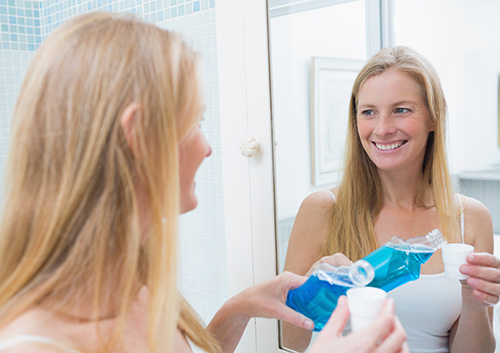Can I use mouthwash instead of flossing?
December 7th, 2023

While mouthwash goes a long way in improving your oral care, it is not a substitute for flossing. Mouthwashes and flossing provide different benefits that you should understand.
Mouthwash Benefits
Mouthwash comes in two categories. Some are considered cosmetic. This type of rinse provides temporary relief from bad breath and has a pleasant taste. These do not actually kill any bacteria.
Therapeutic mouthwashes provide the healthier benefits. These may contain different ingredients including fluoride or antimicrobial agents. This type is used to remove plaque buildup and reduce the potential for calculus formation. Therapeutic rinses can also help prevent cavities, bad breath, and gingivitis. In addition, Dr. Robert Farber, Dr. Corey Farber, Dr. Harry Morris, Dr. Henry Bryan, and Dr. Mark Isler can prescribe special rinses to assist patients after periodontal surgery or other procedures.
Flossing Benefits
Flossing is what removes the plaque formation before it can harden and become calculus. While a rinse reduces buildup, only flossing will fully remove plaque, especially between teeth. The bristles on a toothbrush do not get between teeth completely. If plaque is not removed, it hardens into tartar or calculus. When this builds below the gum line, gum disease can start.
Types of Floss
Floss is available in a thin string form or a tape. It can be waxed or unwaxed. If you find flossing difficult, you might want to try a different type of floss. You can buy bulk floss in containers or purchase the disposable type with a plastic handle attached. This style can be easier for many individuals to use. Interdental picks are available for bridgework or other situations where regular floss cannot be used.
If you have questions regarding the best mouthwash or floss, or need tips for easier flossing, please ask our Dearborn team for advice. We will be glad to give you solutions to help keep your mouth clean and healthy.




 Website Powered by Sesame 24-7™
Website Powered by Sesame 24-7™